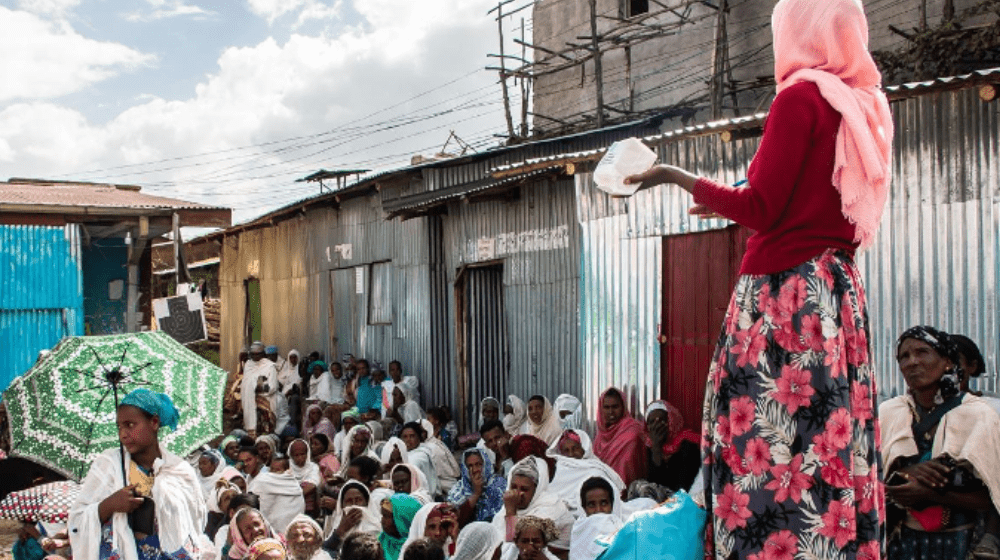GONDAR, Amhara Region - “I can’t afford to buy sanitary pads. If I get some income, it’s for my son. It means a lot to me after losing everything,” says Emebet Mengessha who lives with her 7-month-old son, Bereket, in an informal settlement in Nifas-mewucha woreda, South Gondar zone of Amhara region.
Emebet, a 25-year-old mother, was displaced after hostilities and intercommunal violence broke out in her town, Arisiginele, in Oromia region. Since 2021, violence has intensified in the Oromia region prompting the forced displacement of more than 500,000 people within the region and into the Amhara region.
“Our house was burnt to the ground and our livestock looted. I lost everything in the blink of an eye,” Emebet recounts. “I have no income and live off the support I receive from the community and some relatives,” she adds dejectedly.

Emebet is among the 1,000 women who received the UNFPA Dignity kit at the distribution site in Nifas-mewucha.
In 2022, the Amhara region has been affected by the spillover of conflict from the Tigray region, inter-ethnic conflict in the Oromo zone of the region, drought, floods, desert locust infestation, and disease outbreaks. The region is also home to more than 8,000 Eritrean refugees who have voluntarily relocated from camps in Tigray Region to IDP sites in North Gondar, Amhara Region.
Menstrual Hygiene management during displacement
James Okara, the UNFPA Humanitarian Response Coordinator in Ethiopia said, “In any emergency, sexual and reproductive health and rights are often the most neglected of basic needs. When people are displaced, they carry only what is most essential. Sanitary items are usually not considered essential and are often left behind.”
The lack of menstrual health supplies restricts mobility and personal choices. It affects attendance in school and participation in community life. And it can compromise access to support services during a crisis, causing additional stress and anxiety.
“I dropped out of school the first time I saw my period. As I didn’t have sanitary pads, I didn’t feel confident going out. I didn’t want to feel embarrassed,” recalls Samrawit, 12. She was displaced as a result of the spill-over of conflict in the areas of the Amhara region bordering the Tigray Region. She is currently living in Bahir Dar, the capital of the Amhara region.
Dignity Kits as part of a broader menstrual health and hygiene intervention can help overcome these obstacles. Not only do they fulfill the unmet demand for menstrual hygiene products; but they also restore dignity, build confidence, and strengthen sexual and reproductive health, particularly among adolescents.
Dignity Kits go hand-in-hand with health education and awareness raising where women and girls learn about the services available to uphold their rights and choices.
“Ensuring that women and girls can easily receive critical information on their rights and choices is a crucial part of UNFPA’s work during an emergency. Dignity Kits’ distributions are an entry point to access services on sexual and reproductive health as well as gender-based violence prevention, risk mitigation, and response services,” explains Fathema Sultana, UNFPA Gender-Based Violence Specialist.
Scaling up support on restoring dignity and protection
This year, UNFPA Ethiopia plans on distributing nearly 160,000 Dignity Kits to safeguard the health and protection needs of conflict and drought-affected women and girls across Ethiopia. More than 78,000 Dignity Kits have already reached the Amhara and Tigray regions through strategic partnerships and with the support of the Asylum, Migration and Integration Fund (AMIF), Denmark, Irish Aid, and UNDP.
Despite all efforts, the needs of women and girls are increasing across Ethiopia, which is impacted by multiple crises including conflict, the COVID-19 pandemic, and the worst drought in the last 40 years.
UNFPA urgently requires more funding to scale up its activities to increase access to sexual and reproductive health care, including maternal health and protection services, and strengthen the health systems in eight regions of the country. To date, only 60 percent of UNFPA’s humanitarian appeal of nearly $30 million for 2022 is funded.
Despite the dire situation, Emebet feels grateful for the support received from UNFPA and CERF: “I think this Dignity Kit will really help me to manage my personal hygiene in a dignified way. All the contents in the backpack are things that women need,” says Emebet.


